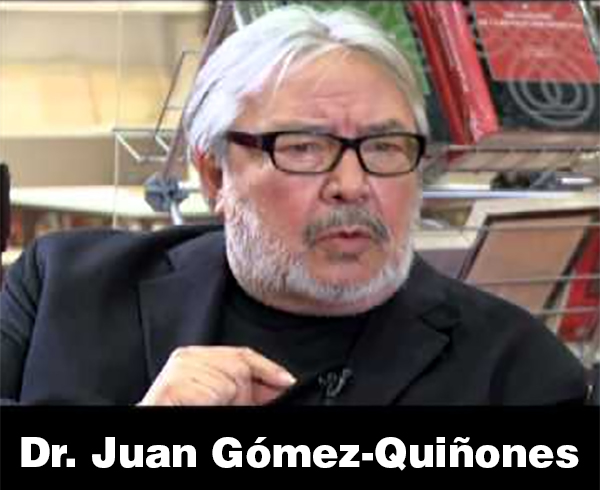On the Passing of Juan Gómez-Quiñones
| revcom.us
Reflections from comrades who knew and worked with him, spanning decades
“We are all witnesses in history-making and must be involved in mapping human survival for a better world future.” – Juan Gómez-Quiñones
On Thursday, November 11, the people lost a precious rebel, Juan Gómez-Quiñones—a historian, poet, academic and activist. Over many decades, we came to know and work closely with Juan and cherish his many extraordinary qualities, as a person and in his professional life. We want to extend our condolences to his family and the broader community of those who feel a great sense of loss, mixed with profound appreciation for what he contributed during his life.
Juan Gómez-Quiñones, or GQ as he was called by many, was a radical in the 1960s, was active in, and shaped by the Chicano liberation movement, and was a key figure in establishing Chicano Studies as an important field in academia. This combination of rigorous intellectual work to better understand the true history of peoples and systems and standing on the side of the oppressed in their struggles was what always came through in any interaction with him.
His whole life, GQ stood with the oppressed in this world. He hated the cruelty and the greed of this system. His dry wit and understated sarcasm illuminated the hypocrisies and inequities. GQ had tremendous courage and self-sacrifice. He knew the powers that be would exact a price against those who dared to stand up against them and refused to back down. He didn’t worry about what his political stands would mean for his academic career but thought instead about what it would mean if he didn’t join with others in standing up. His heart soared when the people rose up, when they lifted their heads to think about a whole better world.
In the period of the 1960s when different oppressed peoples were standing up and demanding an end to that oppression in all spheres, there was an important struggle to establish as legitimate the academic departments focused on the history and present-day reality of these peoples, in departments focused on Ethnic Studies. And as part of that, there was a need to recognize the whole history and character of a section of the people of Mexican descent here in the U.S., oppressed by this system. GQ played a key part in this, establishing the Chicano Studies Research Center at UCLA. These movements had to go up against institutionalized racism in academia and in broader society. GQ fought for the study and recognition of people largely vilified, whose culture and language was demeaned and otherwise ignored. He devoted much of his academic studies to deepening the understanding of relationships between the U.S. and Mexico (and people from Central America), socially, economically and politically.
As the movements of the 1960s ebbed, he critiqued those who “explored the tolerance of the establishment, and in every way possible—rather than questioning the system—pursued what the system offered.” (from Making Aztlán, Ideology and Culture of the Chicana and Chicano Movement, 1966-1977, co-written with Irene Vásquez) As a renowned intellectual in this field, GQ was also a student mentor, giving a space and encouragement for Chicano students to learn their heritage and to contribute to this field of study with intellectual rigor. But he also wanted them to aspire to a better world, not just a better career. He wanted students to learn the history of resistance so they carried this forward, to not just fight against the cruelty of this system but to aspire to a world of kindness, generosity, liberation. In his later years, he wrestled with the problems of relativism and consumerism among students. He wanted them to develop a sense of the importance of the collective, and the need to be part of something that is bigger than yourself. He wanted students to dig into revolutionary theory.
In recent years, as the Trump/Pence regime came to power, GQ wrote about the deep roots of anti-Mexicanism in America’s history. He understood that fascism could happen here and argued that we had to sound the alarm against this, that we had to wage a fight against fascism, and make that fight part of the struggle to get to a better world.
GQ was a friend of the revolution; he vigorously engaged Bob Avakian’s work and was an advocate for others to do the same. He recognized that there was no one who was continuing to develop revolutionary theory the way Bob Avakian (BA) has—not just leading the practical work of building a movement for an actual revolution, but developing the scientific framework and theory for how humanity could get all the way free. While he did not agree with everything that the new communism argues for, he was provoked and hungry to learn what theoretical questions BA was tackling and why. He loved and learned from Avakian’s intellectual rigor and the wide rangingness in his work.
GQ also felt a kindred spirit in BA as someone who has given his life and soul to the struggle of the people to get free. He was stirred by BA’s revolutionary optimism and excited to wrestle with how BA understood the necessity and the possibility of revolution.
GQ will be sorely missed!

Get a free email subscription to revcom.us:

